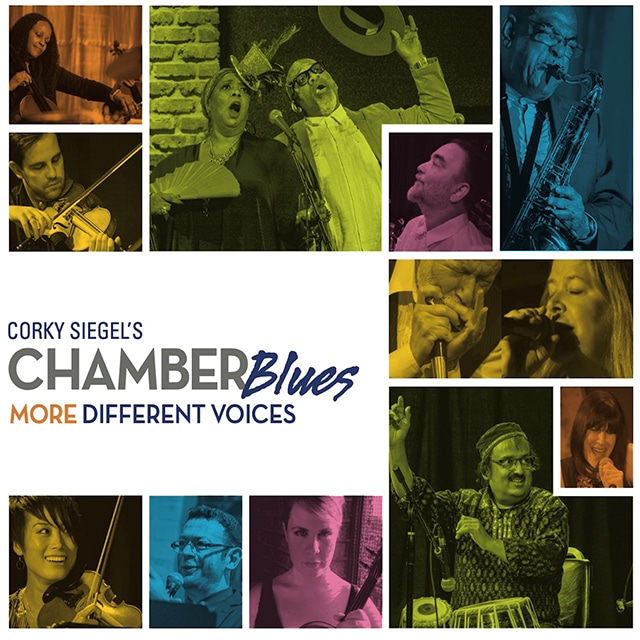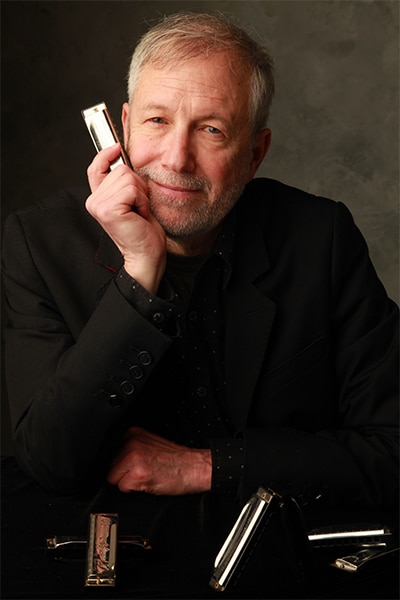
“Mr. Siegel,” an incredulous classical music station interviewer remarked. “Why would you use such a disgusting form of music like the blues?”
The topic was Corky Siegel’s unique ensemble: A classical string quartet paired with blues harmonica.
Seigel might have been the incredulous one, but a “Don’t-you-know-who-I-am?” response would be beneath such a self-assured artist. Siegel is a bluesman whose roots go back to Chicago’s Big John’s Bar and Pepper’s Lounge where in the mid-1960s he performed with Big Joe Williams, Howlin’ Wolf and Muddy Waters. He’s best known for co-founding the Siegel-Schwall Band, which began in 1964 and ended in 2016. Jim Schwall died June 19 at the age of 79.
Siegel’s also known for befriending Maestro Seiji Ozawa of the Chicago Symphony Orchestra in 1966 and creating Chamber Blues, a form of music the classical music station interviewer did not appreciate. “The lyrics are about people killing each other and sex and you can’t understand the words and people are screaming,” he said.
Siegel answered, “Opera. I rest my case.”
“There was a lot of silence after that,” Siegel recalled.
On Friday, Sept. 23, the seventh Corky Siegel’s Chamber Blues album will be released, “More Different Voices.”
Seigel described his music: “The string quartet remains performing in a classical flavor. They are not backing up a blues harmonica. They stay in the classical character and, of course, I stay in the blues character. And then we bring in another element.”
The string players are from all over the globe: Violins Jaime Gorgojo (Spain) and Chihsuan Yang (Taiwan), viola Rose Ambrust and cello Jocelyn Butler-Shoulders (both from Chicago) and tabla (Indian hand drum) Kalyan “Johnny Bongo” Pathak (India).
The other featured element on “More Different Voices” includes saxophonist Ernie Watts, rock ‘n’ roll’s Marcella Detroit, blues’ Toronzo Cannon, country’s Tracy Nelson, acous-tonic’s Frank Orall, Ukraniian cantor’s Pavel Roytman and jazz singer Lynne Jordan.
“After a number of years of performing the Chamber Blues, we decided it would be fun to bring in another genre and start having guest artists so we would find someone who we really loved and asked them if they wanted to do something with us. One of the first ones was Marcella Detroit. I would write a whole version of Chamber Blues of her songs.
“We did a bunch of shows with all these different artists and I thought what I am going to do is take my favorite piece from each artist from each show and make an album. That was “Different Voices.”
Chamber Blues was on tour in the Virgin Islands in March 2020 when the ensemble, in Siegel’s parlance, “ambushed by the damnpandic.”

Siegel turns 80 next month and is diligent about leaving a musical legacy. He said he will complete seven albums in 2022 alone. A pandemic did not deter the making of “More Different Voices.”
“Everyone recorded from their own individual spaces,” Siegel said. “If they didn’t have high-res recording equipment, I bought some recording equipment and sent it to them with instructions. … Special microphones, prototypes from Shure that were attached to the instruments.
“Normally when we are onstage, we rely on each other and play off of each other. But when you are in your own room and there is no one else around, the whole world of expression is on your shoulders. And the way the playing changed from previous recordings and performances is quite profound.”
The album powerfully sets a scene, opening with “No One’s Got Them Like I Do.” Classical strings are followed by blues harmonica. Then vocalist Jordan begins the story: “She was a hot-blooded woman, sending chills up and down his spine. Now she’s got him crying in his wine.”
Opera.
“No One’s Got Them Like I Do” was first recorded on Chamber Blues’ 1994 debut on Alligator Records, which had released Siegel-Schwall records.
“Insurance” is sung by current Alligator Records artist Toronzo Cannon, who sings the blues: “I need a CAT scan but all I can only afford is a kitten scan.”
Marcella Detroit is known for her band Shakespears Sister and her work with Elton John, Aretha Franklin and co-writing “Lay Down Sally” with Eric Clapton. On “There Goes My Man” she sings classically before a harmonica duel (recorded separately) with Seigel.
Frank Orrall and his band Poi Dog Pondering in the late 1980s created organically the sounds now called EDM. He narrates a day-in-a-life story on “Little Blossoms Falling Down.” “The song is an anthem for what we need today,” Seigel said. “We do what we must. We do what we can. But then we must remember what a beautiful world this is.”
One of the album’s most stripped-down songs is “Joyful Jambalaya” with harmonica, viola and two violins. “This is a real good example of classical and blues working together and creating this energy that wouldn’t exist otherwise. (Chihsuan Yang) is playing very classical style, very diatonic. And the harmonica is playing almost like a Sonny Terry type of flavor.”
“Oasis,” written by two-time Grammy winner Ernie Watts, is the standout track. Watts saxophone interplays superbly with Kalyan Pathak’s percussion. “It sure sounds like jazz. But my whole approach was classical, classical, classical against the jazz. It’s not a blend. It’s not a fusion. My project is trying to keep the two separate and working together so that they maintain their characters.”
“Twisted” is an ongoing project for Siegel, who first released the song on Alligator’s Siegel-Schwall 2005 album, “Flash Forward.” It’s also on Siegel’s 2022 blues album, “Something Wrong.”
“Down So Low” has a minimalist arrangement with Tracy Nelson on vocals and piano. “I just want everything that leaves my world, I want it to feel like, that’s perfect. And then I let go. Where it’s bare, you want all the elements all to sing. Nothing gets hidden.” Nelson opened for Siegel-Schwall in a 1967 show at the Avalon in San Francisco.
“Hine Ma Tov Blues song by cantor Pavel Roytman is a Jewish chant stretched into seven minutes of a heartfelt message. “It starts ‘Hoochie Coochie Man’ and goes into Mozart.”
The album ends with something completely different, “Penguins in the Opera House.” It is a children’s poem Seigel wrote in 1973. Twenty years later former Chamber Blues musical director Hans Wurmen wrote music to it. Wurmen was spared from Nazis by an Austrian music teacher, whose other students were killed at Dachau. Coincidentally, Wurmen’s son wrote the music for “March of the Penguins.”
There will be a follow up to the follow up.
“Since we have about 10 artists and I’ve written about three to five pieces for each artist,” Siegel said. “That means we have 50 works that we love, that we’ve performed but have never been recorded. So, this is going to continue. The next one will be ‘Even More Different Voices.’ ”
-Tim Parsons

Corky Siegel’s Chamber Blues
‘More Different Voices’
Label: Dawnserly Records
Release: Sept. 23, 2022
